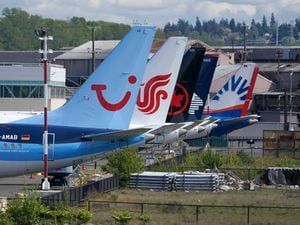Boeing posts £286m loss amid safety scrutiny
The plane maker was rocked after a flight suffered a blowout in January.

Boeing said it has lost 355 million dollars (£286 million) on falling revenue in the first quarter, another sign of the crisis gripping the aircraft manufacturer as it faces increasing scrutiny over the safety of its planes and accusations of shoddy work from whistleblowers.
The chief executive of Boeing said the firm is in “a tough moment”, and its focus is on fixing its manufacturing issues, not the financial results.
Company executives have been forced to talk more about safety and less about finances since a door plug blew out of a Boeing 737 Max during an Alaska Airlines flight over the US in January, leaving a gaping hole in the plane.
The accident halted progress that Boeing seemed to be making while recovering from two deadly crashes of Max jets in 2018 and 2019.
Now those crashes are back in the spotlight, with families of some of the 346 people killed in the crashes scheduled to meet US justice department officials.
Family members have tried unsuccessfully to undo a 2021 settlement between the department and Boeing that let the company avoid criminal prosecution.
Boeing chief executive David Calhoun told employees in a memo on Wednesday: “Although we report first-quarter financial results today, our focus remains on the sweeping actions we are taking following the Alaska Airlines Flight 1282 accident.”
Mr Calhoun ticked off a series of actions the company is taking and reported “significant progress” in improving manufacturing quality, much of it as a result of slowing down production, which means fewer planes for its airline customers.
“Near term, yes, we are in a tough moment,” he wrote. “Lower deliveries can be difficult for our customers and for our financials. But safety and quality must and will come above all else.”
Mr Calhoun, who will step down at the end of the year, said again he is fully confident the company will recover.
Boeing said the first-quarter loss, excluding special items came to 1.13 dollars per share, which was better than the loss of 1.63 dollars per share that analysts had forecast, according to a FactSet survey.
Revenue fell 7.5%, to 16.57 billion dollars (£13.3 billion).
Company shares gained more than 3% in premarket trading.
Boeing stock has plunged by about one-third since the Alaska Airlines door-plug blowout.
The US Federal Aviation Administration has stepped up its oversight and given Boeing until late May to produce a plan to fix its problems.
Airline customers are unhappy about not getting all the new planes that they had ordered because of delivery disruptions.
Boeing, however, has a couple of things in its favour.
Along with Airbus, Boeing forms one-half of a duopoly that dominates the manufacturing of large passenger planes. And it is a major defence contractor for the Pentagon and governments around the world.
Richard Aboulafia, a long-standing industry analyst and consultant at AeroDynamic Advisory, said despite all the setbacks Boeing still has a powerful mix of products in high demand, technology and people.
He said: “Even if they are number two and have major issues, they are still in a very strong market and an industry that has very high barriers to entry.”
And despite massive losses — about 24 billion dollars (£19.3 billion) in the last five years — the company is not at risk of failing, Mr Aboulafia said.
“This isn’t General Motors in 2008 or Lockheed in 1971,” Mr Aboulafia said, referring to two iconic corporations that needed massive government bailouts or loan guarantees to survive.
All of those factors help explain why 20 analysts in a FactSet survey rate Boeing shares as “Buy” or “Overweight” and only two have “Sell” ratings, though five have “Hold” ratings.





